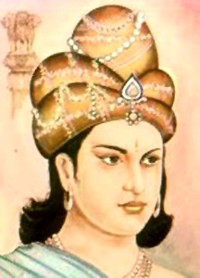Lifetime
Born: 304 BCEPassed away: 232 BCE
About
Ashoka ( अशोक, aśoka, ca. 304–232 BC), popularly known as Ashoka the Great, was an Indian emperor of the Maurya Dynasty who ruled almost all of the Indian subcontinent from ca. 269 BC to 232 BC.
- One of India's greatest emperors, Ashoka reigned over most of present-day India after a number of military conquests.
- His empire stretched from present-day Pakistan, Afghanistan and southern parts of Iran in the west, to the present-day Bangladesh and the Indian state of Assam in the east, and as far south as northern Kerala and Andhra.
- He conquered the kingdom named Kalinga, which no one in his dynasty had conquered starting from Chandragupta Maurya.
- His reign was headquartered in Magadha (present-day Bihar, India).
- He embraced Buddhism from the prevalent Vedic tradition after witnessing the mass deaths of the war of Kalinga, which he himself had waged out of a desire for conquest.
- He was later dedicated to the propagation of Buddhism across Asia and established monuments marking several significant sites in the life of Gautama Buddha.
- Ashoka was a devotee of ahimsa (nonviolence), love, truth, tolerance and vegetarianism.
- Ashoka is remembered in history as a philanthropic administrator; in the history of India Ashoka is referred to as Samrat Chakravartin Ashoka , i.e. the Emperor of Emperors Ashoka, Devanampriya and Priyadarsin.
